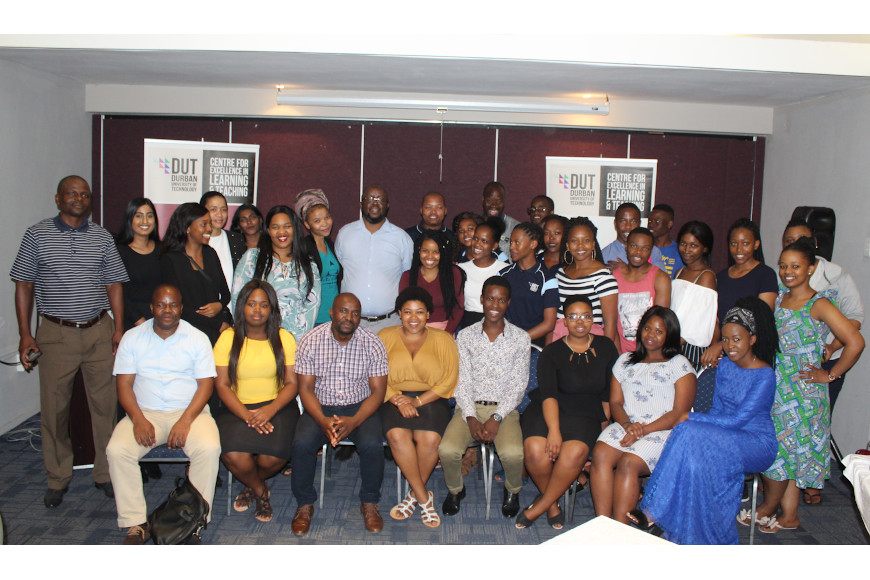The Centre for Excellence in Learning and Teaching (CELT) at the Durban University of Technology (DUT) invited first-year lecturers and first-year students to the First-Year Academy Workshop under the auspices of the DUT First-Year Student Experience (FYSE) programme. The workshop was held at the DUT Hotel School at the Ritson Campus on Wednesday, 10 October 2018.
The FYSE programme, has been in existence since 2014 and is an institutional student development programme meant to build sustainable student communities of living and learning at the University. DUT FYSE programme is built on the realisation that efforts to promote first-year student success begin with focus on student learning, both inside and outside the classroom.
Coordinator Student Development and FYSE Project Leader (CELT), Professor Livingstone Makondo welcomed and thanked everyone for coming to the workshop.
He added that since the adoption by Senate and senior management (2016) of FYSE as an institutional programme, the implementation and scope had expanded to include the entire University. Prof Makondo explained that various stakeholders have been engaged on deliberations linked with the functioning of the programme. He also said that the FYSE has adopted a strategic move of formulating an FYSE Academy which will comprise of first-year lecturers.
“The academy seeks to provide a platform where lecturers of first-year students (and those in subsequent levels) would be actively involved in sharing their experiences of the years they have spent teaching first-year students thus contributing to the formulation of relevant FYSE activities, creating partnerships amongst academic and support departments on FYE activities to avoid duplication, as well as engaging in research activities relating to the FYSE and publishing material that addresses issues relating to FYSE at DUT,” he said.
He further explained that each and every department of the institution that deals with first-year students, needed to take a moment to reflect on what they are doing, and to what extent are lecturers contributing to a students’ success.
“We need to ask ourselves to what extent are we providing relevant academic support that the first-year students want. First-year students drop out because there are challenges that they face such as not having being equipped with the necessary knowledge and skills to allow them to successfully adapt and make the transition from high school to tertiary institutions. As an institution we are required, that when we (lecturers) look at the DUT strategic plan 2.0, specifically, we need to focus on the strategic area to building sustainable student communities of living and learning. In terms as to why students drop out, one of the reasons are that students fail to acclimatise to University life,” he stressed.
The attendees (lecturers and students) were also made to play an educational game which outlined some of the issues first-year students faced. Issues pertaining to not having their priorities set out, no time management skills, low self-esteem, difficult aspects of the academic programme and lack of pre-university preparedness were some of the many problems facing first-year students that were brought up through the thought-provoking game.
Besides analysing issues first-year students were going through, Ashton Maherry from the Siyaphumelela Project, also showcased workshopping the data needs of first-year lecturers and students through his insightful presentation. He explained that the goal of the Siyaphumelela Project is to improve the throughput at DUT in minimum time with a focus on improving the institutional capacity to collect, analyse and integrate student data. His presentation highlighted the various student data available at DUT as well as instruments used to collect data such as Module Performance, Cohort Data, AutoScholar, ITS, Student Engagement Surveys, to name but a few.
The most important segment of the workshop was the student led conversations which gave the first-year students the opportunity to interact with the first-year lecturers in a semi-structured conversational form and to focus on sharing knowledge and creative engagement.
First-year Clothing and Textile Studies lecturer Cherylin Mthembu, listened to the issues made around first-year students obtaining low marks for assignments and said that the first-year students needed to be able to deliver critical academic work and to look at how they can enhance their research element when making assignment submissions or writing tests. She spoke of plagiarism, especially referencing and research which were some of the aspects that students were not making use of when doing submissions, contributing to them (students) receiving low marks. She also stressed that first-year students were accountable for their submissions and the onus were on them to go the extra mile and use their initiatives as well.
First-year Cost and Management Accounting student Keabetsoe Lentsa, said she thoroughly enjoyed the workshop, especially the interaction aspect as this allowed her to bring forward the issues that some first-year lecturers were not aware of.
Rounding off the workshop, Prof Mokondo added that all DUT departments needed to work together in positively enhancing the transition of first-year students into University life, looking at decreasing the drop-out rate during the first year of study, increasing pass rates in the first year of study, to uphold pleasant learning and living experiences to all DUT first-year students, to develop critical thinking skills, and to introduce first-year students to the real world as soon as possible,” he said.
Pictured: The attendees at the First-Year Academic Workshop.
Waheeda Peters


